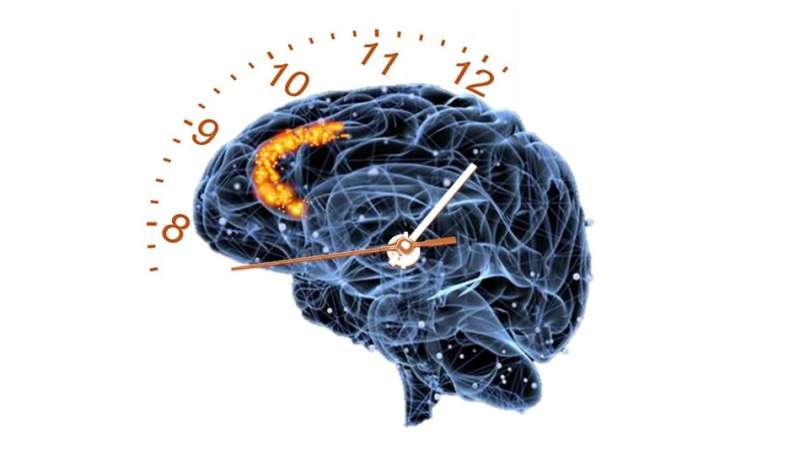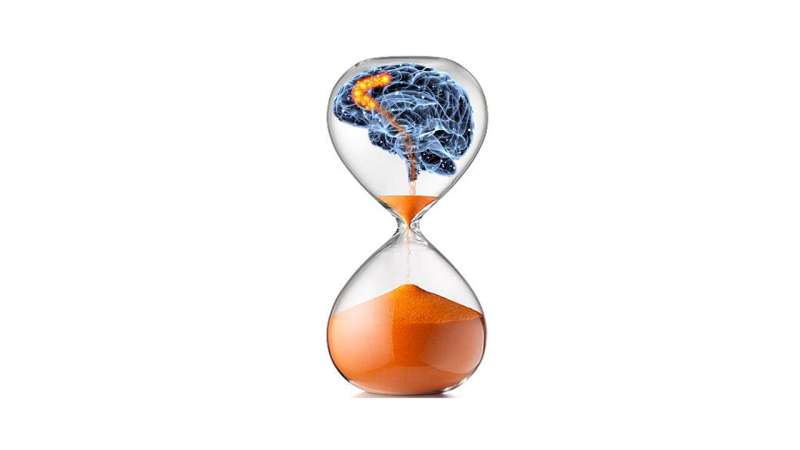This article has been reviewed according to Science X's editorial process and policies. Editors have highlighted the following attributes while ensuring the content's credibility:
fact-checked
peer-reviewed publication
trusted source
proofread
Good timing: Study unravels how our brains track time

Ever hear the old adage that time flies when you're having fun? A new study by a team of UNLV researchers suggests that there's a lot of truth to the trope.
Many people think of their brains as being intrinsically synced to the man-made clocks on their electronic devices, counting time in very specific, minute-by-minute increments. But a study, published in Current Biology, shows that our brains don't work that way.
By analyzing changes in brain activity patterns, the research team found that we perceive the passage of time based on the number of experiences we have—not some kind of internal clock. What's more, increasing speed or output during an activity appears to affect how our brains perceive time.
"We tell time in our own experience by things we do, things that happen to us," said James Hyman, a UNLV associate professor of psychology and the study's senior author.
"When we're still and we're bored, time goes very slowly because we're not doing anything or nothing is happening. On the contrary, when a lot of events happen, each one of those activities is advancing our brains forward. And if this is how our brains objectively tell time, then the more that we do and the more that happens to us, the faster time goes."
Methodology and findings
The findings are based on analysis of activity in the anterior cingulate cortex (ACC), a portion of the brain important for monitoring activity and tracking experiences. To do this, rodents were tasked with using their noses to respond to a prompt 200 times.
Scientists already knew that brain patterns are similar, but slightly different, each time you do a repetitive motion, so they set out to answer: Is it possible to detect whether these slight differences in brain pattern changes correspond with doing the first versus 200th motion in series? And does the amount of time it takes to complete a series of motions impact brain wave activity?
By comparing pattern changes throughout the course of the task, researchers observed that there are indeed detectable changes in brain activity that occur as one moves from the beginning to middle to end of carrying out a task. And regardless of how slowly or quickly the animals moved, the brain patterns followed the same path.
The patterns were consistent when researchers applied a machine learning-based mathematical model to predict the flow of brain activity, bolstering evidence that it's experiences—not time, or a prescribed number of minutes, as you would measure it on a clock—that produce changes in our neurons' activity patterns.
Hyman drove home the crux of the findings by sharing an anecdote of two factory workers tasked with making 100 widgets during their shift, with one worker completing the task in 30 minutes and the other in 90 minutes.
"The length of time it took to complete the task didn't impact the brain patterns. The brain is not a clock; it acts like a counter," Hyman explained. "Our brains register a vibe, a feeling about time. ...And what that means for our workers making widgets is that you can tell the difference between making widget No. 85 and widget No. 60, but not necessarily between No. 85 and No. 88."
But exactly "how" does the brain count? Researchers discovered that as the brain progresses through a task involving a series of motions, various small groups of firing cells begin to collaborate—essentially passing off the task to a different group of neurons every few repetitions, similar to runners passing the baton in a relay race.

"So, the cells are working together and over time randomly align to get the job done: one cell will take a few tasks and then another takes a few tasks," Hyman said. "The cells are tracking motions and, thus, chunks of activities and time over the course of the task."
And the study's findings about our brains' perception of time applies to activities-based actions other than physical motions too.
"This is the part of the brain we use for tracking something like a conversation through dinner," Hyman said. "Think of the flow of conversation and you can recall things earlier and later in the dinner. But to pick apart one sentence from the next in your memory, it's impossible. But you know you talked about one topic at the start, another topic during dessert, and another at the end."
By observing the rodents who worked quickly, scientists also concluded that keeping up a good pace helps influence time perception: "The more we do, the faster time moves. They say that time flies when you're having fun. As opposed to having fun, maybe it should be 'time flies when you're doing a lot.'"
Takeaways
While there's already a wealth of information on brain processes over very short time scales of less than a second, Hyman said that the UNLV study is groundbreaking in its examination of brain patterns and perception of time over a span of just a few minutes to hours—"which is how we live much of our life: one hour at a time. "
"This is among the first studies looking at behavioral time scales in this particular part of the brain called the ACC, which we know is so important for our behavior and our emotions," Hyman said.
The ACC is implicated in most psychiatric and neurodegenerative disorders, and is a concentration area for mood disorders, PTSD, addiction, and anxiety. ACC function is also central to various dementias including Alzheimer's disease, which is characterized by distortions in time.
The ACC has long been linked to helping humans with sequencing events or tasks such as following recipes, and the research team speculates that their findings about time perception might fall within this realm.
While the findings are a breakthrough, more research is needed. Still, Hyman said, the preliminary findings posit some potentially helpful tidbits about time perception and its likely connection to memory processes for everyday citizens' daily lives. For example, researchers speculate that it could lend insights for navigating things like school assignments or even breakups.
"If we want to remember something, we may want to slow down by studying in short bouts and take time before engaging in the next activity. Give yourself quiet times to not move," Hyman said. "Conversely, if you want to move on from something quickly, get involved in an activity right away."
Hyman said there's also a huge relationship between the ACC, emotion, and cognition. Thinking of the brain as a physical entity that one can take ownership over might help us control our subjective experiences.
"When things move faster, we tend to think it's more fun—or sometimes overwhelming. But we don't need to think of it as being a purely psychological experience, as fun or overwhelming; rather, if you view it as a physical process, it can be helpful," he said.
"If it's overwhelming, slow down or if you're bored, add activities. People already do this, but it's empowering to know it's a way to work your own mental health, since our brains are working like this already."
More information: Ryan A. Wirt et al, Temporal information in the anterior cingulate cortex relates to accumulated experiences, Current Biology (2024). DOI: 10.1016/j.cub.2024.05.045




















